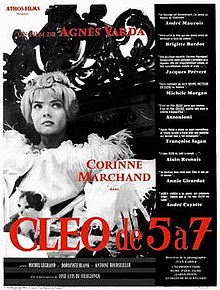Cleo de 5 a 7
| Cléo from 5 to 7 | |
|---|---|

Original poster
|
|
| Directed by | Agnès Varda |
| Produced by |
Georges de Beauregard Carlo Ponti |
| Written by | Agnès Varda |
| Starring |
Corinne Marchand Antoine Bourseiller Dominique Davray Dorothée Blanc Michel Legrand |
| Music by | Michel Legrand |
| Cinematography |
Jean Rabier Alain Levent |
| Edited by |
Rose Sokol Janine Verneau |
|
Release date
|
|
|
Running time
|
90 minutes |
| Country | France Italy |
| Language | French |
Cléo from 5 to 7 (French: Cléo de 5 à 7) is a 1962 Left Bank film by Agnès Varda. The story starts with a young singer, Florence "Cléo" Victoire, at 5pm on June 21, as she waits until 6:30pm to hear the results of a medical test that will possibly confirm a diagnosis of cancer. The film is noted for its handling of several of the themes of existentialism, including discussions of mortality, the idea of despair, and leading a meaningful life. The film also has a strong feminine viewpoint belonging to French feminism and raises questions about how women are perceived, especially in French society. The role of mirrors are prevalent to symbolize self-obsession, which Cléo embodies.
The film includes cameos by Jean-Luc Godard, Anna Karina, Eddie Constantine and Jean-Claude Brialy as characters in the silent film Raoul shows Cléo and Dorothée, while composer Michel Legrand, who wrote the film's score, plays "Bob the pianist". It was entered into the 1962 Cannes Film Festival.
Cléo Victoire (played by Corinne Marchand) is having a tarot card reading with a fortune teller, who tells her that there is a widow in Cléo's life, who is completely devoted to her, but is also a terrible influence (her maid, Angèle). The fortune teller also sees that Cléo has recently met a generous young man, which she confirms, claiming that she doesn't see him too often, but he got her into the music industry. There is also an evil force in Cléo's life: a doctor. The fortune teller then pulls the hanged man card, meaning that Cléo is ill, potentially with cancer. She then proceeds to pull the death tarot card, and Cléo requests that the fortune teller read her palm. After examining her lifeline, the fortune teller remains silent before telling Cléo that she does not read hands, leading for Cléo to believe that she is doomed.
...
Wikipedia
